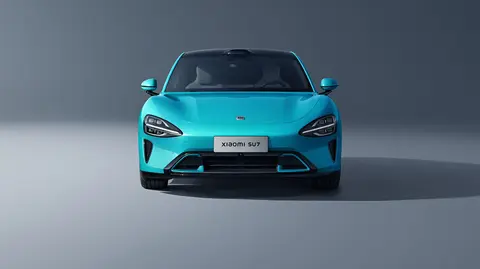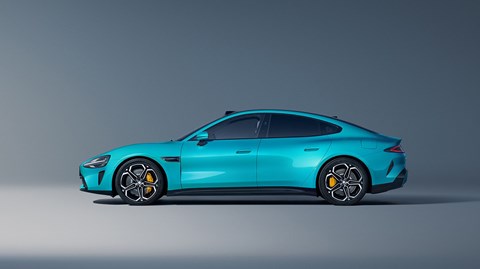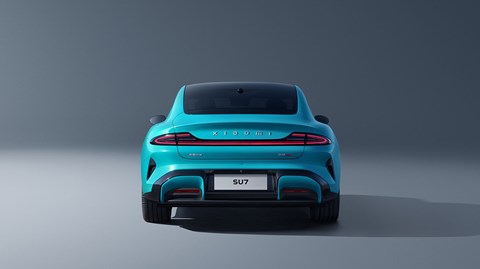► Xiaomi’s first EV launches in China
► High-power flagship priced from £24k
► Aims at Porsche and Tesla
Smartphone manufacturer Xiaomi has revealed its first electric car – and no, despite its name it’s not an SUV. Called the Xiaomi SU7, it’s a low-slung sports saloon that’s more Taycan than e-Tron in its execution.
The Xiaomi EV launch has caused something of a meltdown among electric car fans and the company cites a six-month waiting list, just days after the vehicle was launched in China. It took 88,898 orders in the first 24 hours.
Pricing has been announced for the breakthrough EV and the cost is startlingly cheap, considering the level of performance on offer: in China the regular car is priced from 219,900 yuan, equivalent to just £24k at current exchange rates, rising to 299,900 yuan for the range-topping Max (or £33k).
Unveiled in Shanghai in late 2023, the SU7 (SU being short for Speed Ultra) will spearhead a £8.9 billion push into electric cars for the smartphone maker – and there are big plans ahead.
‘By working hard over the next 15 to 20 years, we will become one of the world’s top five automakers, striving to lift China’s overall automobile industry,’ said Xiaomi CEO Lei Jun, speaking at the car’s debut. It’s a bold ambition by the electronics giant, which is rated as the world’s third biggest smartphone manufacturer with a market share of 12%.

It is not yet clear when Xiaomi will launch in the UK, but those prices would likely rise considerably if the model were exported here.
The Xiaomi SU7: in detail
A cheaper, high-volume EV is a likely long-term goal for Xiaomi (especially given its position in the smartphone market), but right now it needs to focus on brand building – and the SU7 is the product to do it.
Xiaomi’s new flagship will be looking to fight with Porsche’s Taycan and the Tesla range of high-performance saloons in both performance and features, with Jun saying the company is looking to build ‘a dream car comparable to Porsche and Tesla.’
On the outside, the SU7 certainly bears a resemblance to its competition from Stuttgart – partly because of the design choices necessary when building a low-drag EV – but it looks to have competitive specs, too.

That slippery, teardrop shape contributes to an impressively aerodynamic 0.195Cd drag figure.
Battery specs, performance
The SU7 will be available in single- or dual-motor variants, with the top all-wheel drive model getting 475kW of power, equivalent to a heady 664bhp. That’s good for a 0-62mph launch of just 2.78 seconds and top speed of 165mph, according to Xiaomi.
Dynamics aside, the top SU7 looks to be competitive on paper, then. Range will vary between 434 and 515 miles, depending on the spec, thanks to battery sizes ranging from 74kWh in the entry model to 101kWh in the Max. Full specs look like this:
- Xiaomi SU7: 74kWh battery, 434-mile range, 5.3sec 0-62mph, 130mph top speed
- Xiaomi SU7 Pro: 94kWh battery, 515-mile range, 5.7sec 0-62mph, 130mph top speed
- Xiaomi SU7 Max: 101kWh battery, 497-mile range, 2.8sec 0-62mph

Xiaomi says the SU7 will have autonomous tech similar in performance to Tesla when it’s released later in 2024.
What else?
The other big draw for the SU7 will be an operating system shared with its booming mobile device business. In the same way Porsche, Aston Martin and others are now doubling down with Apple on CarPlay integration, Xiaomi can leverage its smartphone tech to foster familiarity with its EV interiors.
The Xiaomi SU7’s operating system is integrated with the company’s proprietary HyperOS in its phones and laptops
Xiaomi EVs will be manufactured in a state-owned BAIC Group factory in Beijing, with a claimed capacity of 200,000 units a year.